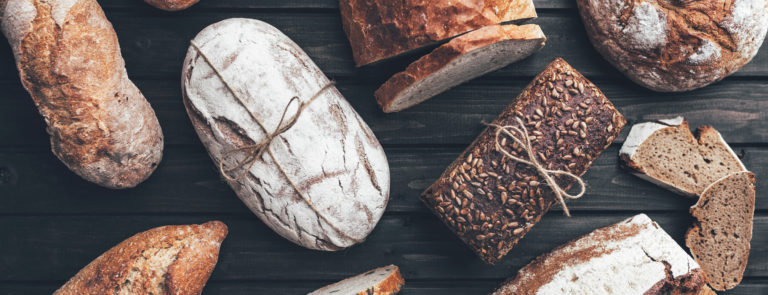15% off £35 OR 20% off £45
What are refined carbohydrates? Are they bad?

With the conflicting advice out there about whether they’re good for us or not, carbs can seem complicated.
And there’s a simple reason for this fact - people seem to either love or hate them.
There are, in fact, two different types of carbohydrates – refined carbs and complex carbs – which each come with their own different set of properties.
In this article, we explore carbs overall, as well delve a bit deeper by taking a closer look at refined carbs in particular.
What are carbohydrates?
Overall, carbs fall into two main categories – ‘refined’ carbohydrates (which consist of the carbohydrate sub-type sugar), and ‘complex’ carbohydrates (which consist of the carbohydrate sub-types starch and fibre).
In addition to the two main categories of carbohydrates, there’s also three separate sub-types - sugar, starch and fibre.1
The 3 main types of carbs are:
-
Sugar
Also referred to as ‘free sugars’, this form of sugar has been added to food and drink, including biscuits, chocolate, flavoured yoghurts, breakfast cereals and fizzy drinks.
Note – the natural form of sugar in food, such as honey and vegetable juice may naturally exist, but they’re still classed as free sugars.
-
Starch
Starch is found in food that comes from plants, particularly starchy foods, such as bread, rice, potatoes and pasta, which provide us with a steady energy source that’s drip-fed to our bodies throughout the day.
-
Fibre
Fibre also has a plant connection; it’s present in the cell walls of plants.
For example, fruit and vegetables, wholegrain bread, wholewheat pasta, and pulses (beans and lentils).
As for how many of these 3 different carbohydrates we should eat, advice from the Government says that just over a third of our diet should be made up of starchy foods, such as potatoes, bread, rice and pasta.
And over another third should be fruit and vegetables. As a result, this means over half of our daily calories should come from starchy foods, fruit and vegetables.
Carbohydrates are fundamental to helping maintain good everyday health.
Not only are they the body’s main energy source, fibre in particular helps with good bowel health, reduces the risk of constipation, and helps reduce cholesterol levels too.
Meanwhile, starchy foods are a particularly good source of fibre and are key to helping us being a healthy weight because they fill us up for longer. Fibre-rich foods also have the same filling effect too, which can help reduce your calorie intake.
The human body can exist without sugar, but not without carbs because they essentially fuel our body every single day.
If we don’t put carbohydrates into our body, then it will use protein and fat for energy instead.
What are refined carbs?
Refined carbohydrates, also known as ‘simple’ carbs, refer to sugars (e.g. glucose, fructose, sucrose) or anything made from grains that have had the fibrous wheatgerm and bran removed from them.2
Grains that have been refined, are so refined, that all of their goodness; all of the vitamins and minerals they naturally contain, are lost during the refining process.
As a result, this means they provide very little nutritional value, these ‘bad’ or refined carbs, which have a high GI (more on this below) are digested really quickly by our body too.
In turn, this can have a negative impact on the body in numerous ways, which includes causing mood and energy fluctuations and a build-up of fat, especially around the waistline.
More importantly, refined carbs can also interfere with our blood sugar level, which can lead to overeating, weight gain, insulin resistance, and potentially, Type 2 diabetes. We’ve explained why in the next section…
Are refined carbs bad?
All refined carbohydrates are made up of short chains of molecules that are rapidly and easily converted to glucose in your body, which causes a sudden blood sugar raise, or ‘spike’, soon after eating.
When this happens, your body produces lots of insulin, which enables the glucose to enter your body’s cells and be used as energy.3
Insulin is vital in helping the human body convert food into energy, but if you are experiencing several blood sugar spikes throughout each day, your body can over-produce insulin, which can lead to insulin resistance.
Insulin resistance is when your body’s cells no longer recognise insulin; it also happens to be a contributory factor to developing Type 2 diabetes.
Regular consumption of refined carbs can also lead to weight gain.
This is due to a number of factors; mainly the fact refined carbs leave you hungrier and more prone to snacking between meals and overeating.
What’s more, the low fibre content in most refined carbs means you won’t experience the benefits of a high-fibre diet, such as reduced sugar cravings, feeling of satiety and happier gut bacteria.
Nutritionists generally advise avoiding refined carbs as much as possible, leaving them for an occasional treat rather than being consumed at every meal.
Are carbs connected to the Glycaemic Index (GI)?
You may have heard of the Glycaemic Index in relation to carbohydrates.
The GI is a ranking system for carbohydrates that’s based on how quickly our bodies convert them into glucose.
The GI ranges from 0 to 100, according to how much the food raises your blood sugar level after you’ve eaten it, with 100 being equivalent to pure glucose.
Foods that have a high GI are quickly broken down and turned into glucose by your body, which leads to a spike in your blood sugar level.
They are usually (but not always) refined carbohydrates, with low GI foods converting into glucose slower. They are normally complex carbohydrates.
Summary
- There are two different types of carbohydrates – refined carbs and complex carbs
- Within this are these three carbs – sugar, starch and fibre
- Refined carbohydrates refer to sugars (e.g. glucose, fructose, sucrose) or anything made from grains that have had the fibrous wheatgerm and bran removed
Refined carbs list
Refined carbs are everywhere. And they’re pretty easy to spot, once you realise the type of food that tends to contain them.
Refined carbs examples include:4
- Fizzy drinks and some fruit juices and smoothies
- White pasta
- White bread, bagels, waffles
- White flour
- Noodles
- Crackers
- French fries
- BBQ sauce
- Salad dressings
- White rice
- Pizza
- Crisps
- Shop-bought smoothies
- Sports drinks
- Sugar-sweetened foods, such as cakes, biscuits, sweets and pastries
- Flavoured yoghurt and frozen yoghurt
- Sweetened breakfast cereals, cereal bars and energy bars
If you’re not sure if a food you’re planning to eat is packed full of refined carbs or not, check the nutritional information.
2 of the worst refined carbs food sources:
White bread and white rice are right up there when it comes to being refined carb culprits.
White bread
A slice of refined white bread, which has the highest GI of all foods, contains 12.7g of carbs, 1.1g of which is sugar and 0.6g is fibre. Because the fibre content is so low, it can increase blood sugar levels and trigger insulin spikes.
White rice
One cup of white rice contains 205 calories. It provides 44.5g of carbs, 0.6g of fibre and 4.2g of protein.
In comparison, a cup of brown rice contains 216 calories and provides 44.8g of carbs, 3.5g of fibre and 5g of protein.
It also contains B-complex vitamins, magnesium, selenium and copper.
Despite brown rice containing slightly more calories and carbs than white rice, it contains nearly six times more fibre.
Summary
- Refined carb food examples include white bread, pasta and flour and sweets, cakes, pizza and crisps
- White bread and white rice are two of the worst forms of refined carbs
- White bread has the highest GI rating of all food
What’s the difference between refined and unrefined carbs?
We’ve talked you through what carbs are, which includes refined carbs, but what about unrefined carbs?
What are they and how do they compare to refined carbohydrates?
Refined carbohydrates
As we mentioned at the start of this article, refined carbs have been refined, so that they no longer resemble their original state from a nutritional perspective.
Because of this, they are the worst form of carbs around, mainly because some of them cause blood sugar spikes and contribute to other health issues, e.g. Type 2 diabetes.
The main reason why we tend to eat refined carbs and love them so much is because they taste so good – i.e. doughnuts, pizza, fizzy drinks, cookies etc.
What’s more, many refined carbohydrates have had sugar additives added to them, which can be addictive.
Unlike unrefined carbs, refined carbs take much longer for our bodies to digest due to the high sugar content.
In the meantime, they provide the body with minimal to zero nutrients and hardly any energy to keep us going.
Refined carb food sources include: packaged cereals, white bread, white rice, pasta, cakes, biscuits, sweets, pastries, pies, white flour, beer, sweet white wine and sherry.
Unrefined carbohydrates
These are carbs that are in their natural state.
And because they are so natural, they still contain all of their naturally-occurring fibre, vitamins, minerals and nutrients that give us energy to get up and go every day.
Meanwhile, fibre in particular helps maintain healthy blood sugar levels and controls our appetite by effectively forming a barrier to our digestive system (which is why, when we eat fibre, we feel full up for longer).
Around 20g to 45g of fibre is the daily recommended intake, but you’ll only find this amount in unrefined carbs; wholegrain bread and wholegrain cereals are two of the best unrefined carb providers.
Other unrefined carb food sources include: brown rice, beans, oatmeal, bran cereal, millet, barley, couscous, wheat, vegetables, lentils, herbs, lamb, poultry and other wholegrain products.
Handpicked content: Healthy examples of carbohydrates
How do you avoid refined carbs?
Avoiding refined carbs isn’t easy for everyone, especially when research has found that we are instinctively programmed to love carbs.
While it’s ok to keep eating unrefined carbs - in fact, the more you add to your diet, the better – most, if not all, of the health advice out there, recommends cutting back on or cutting out refined carbs.
How do you do it? The key to avoiding refined carbs is to think about what you’re eating before you eat it.
While this may sound like simple advice, not everybody’s in the habit of checking food labels to see what their food exactly contains, which is the best way to monitor your refined carbs intake.
On the whole, refined carbs are crammed full of carbs, sugar and contain minimal fibre. Whereas unrefined carbs are loaded full of fibre and other nutritional goodness.
Avoiding refined carbs involves checking every single food label, and being disciplined enough to choose unrefined over refined carbohydrates going forward. Here are some food swap ideas to help you get started:5
- Make pancakes from bananas and eggs instead of grains for breakfast.
- Remember that natural sugars are classed as free sugars and need to be limited.
- Choose Greek yoghurt or Icelandic yoghurt over fruit yoghurts; they contain less lactose and therefore less sugar.
- Use mashed up fruit instead of fruit jam, which is loaded with sugar.
- Eat cauliflower rice instead of white rice, which contains less carbs and more fibre.
- Choose spaghetti squash over white pasta.
- Use cauliflower to make your pizza bases.
- Avoid eating buns with your burgers, just eat the meat and salad instead.
- Make your own salad dressings that are less carb-heavy than shop-bought ones.
- Snack on veggie sticks instead of crisps.
- Drink alcohol on the rocks or wine rather than cocktails that can be full of sugar and carbs.
- Fill your plate with lots of vegetables that will fill you up for longer because of their fibre content.
- Avoid sugar alternatives and sweeteners, they prime the body for a sugar that never comes, which can then make you feel hungry.
- Grab a homemade nut seed bar over energy bars with fruit in them, as they’re full of carbs and sugar. (Try this recipe: ‘How to Make Healthy Snack Bars.’)
Handpicked content: Are sweeteners good or bad for you?
Summary
- Refined carbs are the worst form of carbs around and have minimal nutritional value
- Unrefined carbs are carbs that are in natural, nutritious state
- Checking the food labels is all it takes to avoid refined carbs
Takeaway
While refined carbs may taste so good, they don’t really do much good for our body.
Unrefined carbs are by far the better of the two, for so many reasons, ranging from digestive health, to fueling our bodies with the energy it needs to function healthily every day.
Yes, refined carbs can be enjoyed, but it’s best to enjoy them in moderation, and fill your diet with unrefined carbs that still contain an abundance of natural goodness, which doesn’t just include fibre, but vitamins, minerals and nutrients too.
For more insight on the relationship between food and blood sugar levels, check out this article, ‘4 blood sugar balance tips.’
Last updated: 19 July 2021
- https://www.nhs.uk/live-well/healthy-weight/why-we-need-to-eat-carbs/
- https://www.helpguide.org/articles/healthy-eating/choosing-healthy-carbs.htm
- https://www.diabetes.co.uk/insulin-resistance.html
- https://www.livestrong.com/article/28412-list-refined-carbs/
- https://www.eatthis.com/carb-cutting-hacks/













